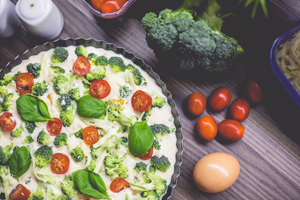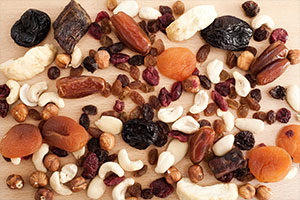Chronic constipation is one of the most common digestive disorders in many patients across the world.1,2,3
Most people experience occasional bouts of constipation.
So, what are the main foods that we should avoid? On the contrary, what are the foods that will help us to fight constipation?
Read more about what to do about constipation
Fibre and fluids to help avoid constipation.

One of the main causes of constipation is a diet high in animal fats (meats, dairy products and eggs) and refined sugar (rich desserts and other sweets), but low in fibre.1,3,4,5,6
The first advice to alleviate constipation is simple: you must drink more fluids! It has been shown that not drinking enough water and fluids and being dehydrated can be directly linked to constipation. The daily recommendation for fluid intake is 1,5 –2 liters (6–8 glasses).1,7
The second advice to avoid constipation: eat more fibre. Fibre is found in natural foods such as fruit and vegetables, legumes, nuts, seeds and grains. 1, 7
Studies have shown that high fibre diets create larger stools and more frequent bowel movements.5 Dietary fibre retains water, adds bulk to stools, and subsequently relieves constipation.1
Increase dietary fibre1,5,7,8

Follow a healthy diet, including fibre e.g. wholemeal cereals and bread, bran, fresh fruit and vegetables. Insufficient dietary fibre is associated with constipation.1
Fibre rich foods include1,5,7,8
- Fruit such as apples, peaches, pears, cherries, raisins, grapes and prunes
- Vegetables
- Bran cereals, muesli, oats and unprocessed bran
- High-fibre or whole-wheat breads and crackers
- Brown rice, brown pasta
- Grains including barley, corn, quinoa, wheat, chia, rye
- Legumes such as beans, peas, chickpeas, lentils
- Seeds such as flax, sunflower, sesame, poppy seeds, and nuts such as almonds, cashews, macadamia, peanuts, pistachios and walnuts
Include 5–6 portions of vegetables, two servings of fruit, and choosing high fibre bread and cereals every day to achieve a daily intake of 20–35 g fibre in your diet. Also eat nuts, seeds, and beans regularly.1,7 Limit your intake of fried vegetables such as potato chips or crisps.7
Increase fluid intake1,5,7,8
Ensure adequate fluid intake, especially water.1
Doctors agree that prevention is the best approach to constipation and fibre and water work together to keep us regular.5,7
The daily recommendation for fluid intake is 1,5 –2 litres (6–8 glasses).1,7 But the positive effects of dietary fibre are enhanced by water intake of at least two litre per day.1
Choose to drink water rather than fruit juice or drinks with added sugar (soft drinks, energy drinks). Tea and coffee also contribute to your fluid intake.7,8
Read also: Tips to manage constipation
References :
1: Sibanda M, Meyer JC, et al. Chronic constipation in adults. S Afr Pharm J. 2018;85(1):34-42.
2: Chassagne P, Ducrotte P, et al. Tolerance and Long-Term Efficacy of Polyethylene Glycol 4000 (FORLAX®) Compared to Lactulose in Elderly Patients with Chronic Constipation. J Nutr Health Aging 2017;21(4):429-439.
3: Chaussade S, Minić M. Comparison of efficacy and safety of two doses of two different polythene glycol-based laxatives in the treatment of constipation. Aliment Pharmacol Ther 2003;17:165–172.
4: Belsey J, Geraint M, et al. Systematic review and meta analysis: polyethylene glycol in adults with non-organic constipation. Int J Clin Pract 2010;64(7):944-955.
5: South African Gastroenterology Society (SAGES). Constipation. [Internet]. Available from: https://www.sages.co.za/patients/constipation (Accessed March 2019).
6: Forlax Proposed Package Insert. March 2015.
7: Continence Foundation of Australia. Healthy Diet and Bowels. [Internet]. Available from: https://www.continence.org.au/download_attachment…/healty-diet-and-bowels.pdf (Accessed March 2019).
8: Department of Health. Food-Based Dietary Guidelines for South Africa. FBDG-SA 2013. S Afr Clin Nutr 2013;26(3)(Supplement):S7.


